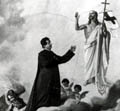

| RMG – GC27 : 80th Anniversary of the Canonization of Don Bosco |
| RMG – Long Live Saint John Bosco! |
Seventy five years later
On 1 April 1934 – the Solemnity of Easter and the conclusion of the Extraordinary Jubilee Year of the Redemption – Pope Pius XI proclaimed the priest from Turin John Bosco (1815-1888) a saint.
In this way the long process was brought to an end of the beatification and canonisation, which began in Turin on 4 June 1890. The first phase (the “ordinary process,” called thus because it is conducted under the responsibility of the Bishop, the Ordinary of the place) was concluded on 1 July 1897. Only ten years later on 24 July 1907, was the “apostolic process” (Roman) begun. This lasted twenty years, until 8 February 1927, and went through various stages. Suffice to say that at the end of one of the preparatory meetings – that held on 20 July 1926 – it seemed to some that the Cause of canonisation could not go any further.
But the authoritative intervention of Pius XI – who as a young priest had known Don Bosco personally (“We are very please to be among the oldest personal friends of the Venerable Don Bosco”, the newly elected Pontiff had said in a memorable audience), and he had preserved the highest esteem for him– made them repeat the meeting a few months later, on 14 December 1926.
The success of this new meeting opened the way for further progress in carrying forward the process: the so-called General Congregation held in the presence of the Pope (8 February 1927), and the subsequent Reading of the Decree on the heroicity of the life and the virtues of the Venerable John Bosco (20 February 1927).
In this way after the examination of the four miracles then required (two for the beatification and two for the canonisation), it was possible to proceed with the beatification on 2 June 1929, and finally the canonisation, as mentioned on 1 April 1934.
The Roman process (1907-1927) – carried out as was then the norm according to the method of the “objections” (animadversiones, brought forward by the so-called “devil’s advocate”) and the “replies” (responsiones, prepared by the advocate for the defence, appointed by the Postulation) – contains the most interesting elements to reflect on in regard to the significance still relevant today of the canonisation of Don Bosco, seventy five years later.
The objections are quite well-known. It was a question above all of the “cunning” shown by Don Bosco, motivated, according to the “devil’s advocate”, by a burning desire for personal success and economic profit. There was also – for the same reasons – the accusation of a certain “brain-washing” with regard to the boys, of “a lack of transparency” (this is today’s terminology) in obtaining charity funding and legacies, and of disobedience, more or less systematic, towards Archbishop Gastaldi of Turin.
The reply to this objection comes – in addition to those established for the formal process – from the supreme authority of the Pope: consequently, above all else the words of Pius XI remain the essential starting point for any interpretation nowadays of the profound significance of Don Bosco’s canonisation.
At the conclusion of the Roman process on 8 February 1927, the Pope said: “The Venerable Don Bosco belongs to the magnificent category of men chosen among all human beings, to these colossal people called on to create a beneficent grandeur. If the scrupulous analysis of his virtues which has been carried out in the preceding long and repetitious debates is followed by a synthesis which gathers together all the scattered lines, then you can easily reconstruct his splendid magnificent likeness. And his immeasurable and unfathomable humility could not disguise it.”
And finally in his homily on 1 April 1934, this “great figure” was solemnly described as “the apostle of youth wholeheartedly dedicated to the glory of God and the salvation of souls,” distinguished by daring ideas and modern means in the complete education of the whole person: an education which – according to the words of Pius XI, in a not too veiled critical allusion to the fascist culture of the time – should not be confined to the mere development of muscular strength but aimed at educating and strengthening the spirit and encompassing the whole person, teaching human sciences but never overlooking the supernatural and divine virtues.
In other words, the canonisation of Don Bosco reminds educators of today in very clear terms of the perennial validity of the preventive system, based on reason, religion and loving-kindness, aimed at producing the upright citizen and the good Christian: an educational system proven, in little over century by a host of champions of youthful holiness such as Dominic Savio, Laura Vicuňa, the five boys the martyrs of Poznań, Alberto Marvelli, the young Spanish martyrs, Zephyrinus Namuncurà…
Because of this the priest from Turin John Bosco gave his life, challenging the “conformists” of every age. Because of this he exercised heroic virtue. Because of this he is a saint and is for every in the glory of God.
Fr Enrico dal Covolo
Postulator General for the Causes of Saints
